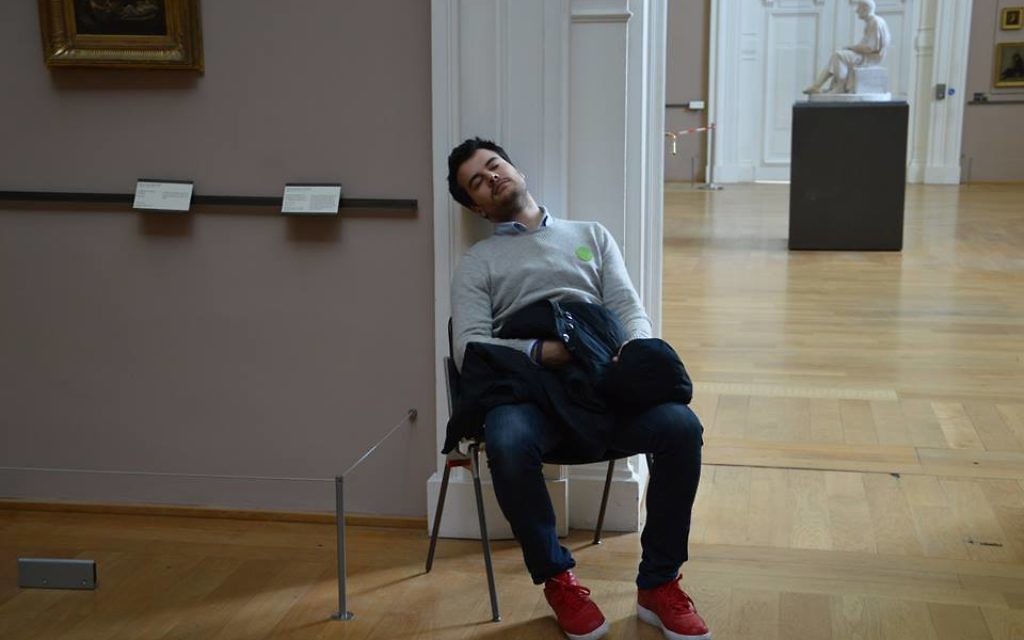Sleep-Deprived but Learning on Shavuot
Face-to-face discussion is more respectful and more valuable than online ranting.
Tuesday nights are when we at the AJT are at our worst.
The newspaper goes to press around 5 p.m. most Tuesdays, and by the time the electronic file reaches Walton Press for printing, I don’t have a lot of energy or social skills left. If I’m still awake by the time Final Jeopardy rolls around just before 8 o’clock, it’s probably because I needed a glass or two of bourbon before bed.
The point isn’t to explain my poor attendance at Tuesday-night events, but to emphasize how much it meant to myself and other AJT staffers and contributors to be a part of the all-night Shavuot study session and dairy feast Tuesday night and Wednesday morning, May 30 and 31, at Ahavath Achim Synagogue.
Get The AJT Newsletter by email and never miss our top stories Free Sign Up
After getting little sleep while working on the paper Sunday and Monday nights, the idea of staying awake and trying to be coherent past 5 a.m. Wednesday for Shavuot was intimidating.
It also proved impossible: I called it a night at 4 a.m. after sleeping through much of what seemed like an entertaining storytelling session. If I can’t keep my eyes open for stories from Chelm, my tank is empty.
But we at the AJT couldn’t pass up the invitation to join AA for the night and to interact with up to 100 readers, potential readers and perhaps former readers on several important topics. AA and the night’s organizer, Robyn Faintich, let the AJT lead four sessions.
The first was a discussion about individual and collective bias and whether the AJT leans left or right or neither or both when it comes to politics. The questions were great, the dialogue was calm and genuine, and no one accused me of being either a fascist or a socialist. The lesson: Face-to-face discussion is more respectful and more valuable than online ranting.
The second and best session was a chance for reporters to talk about the stories behind some of their memorable stories — how they got them, why they did them and what made them stand out. The lesson: The best stories find you, as long as you’re ready to run with them.
The third session was supposed to be a panel discussion about the place of Israel in a Jewish community newspaper. I was looking forward to hearing from readers what they do and don’t want to read about Israel in the AJT, but the topic apparently didn’t excite anyone.
Only Rabbi Laurence Rosenthal joined the half-dozen AJT representatives, and our conversation focused more on the nuts and bolts of the newspaper than Israel. The lesson: We at the AJT too often assume readers understand the lines we draw between objective reporting and subjective opinions, and it’s my job to explain those lines and differences better.
By 2 a.m., when we were supposed to talk about what makes a story Jewish enough for the Jewish Times, the few of us left weren’t capable of high-level thinking. We started addressing the question of how to cover a political race between a Jew and a non-Jew — e.g., Jon Ossoff vs. Karen Handel — and wound up talking about what defines tall among Jewish men. The lesson: Don’t look for deep meaning after 2 a.m.
The highlight of the night wasn’t an AJT session, but Emory Center for Ethics Director Paul Root Wolpe’s discussion on morality in animals, the shortcomings of an ethical code based on pure reason and, most important, why Jews eat Chinese food. It’s a brilliant theory — perhaps he’ll publish it someday — but it would be unethical to spoil his surprise. One hint: Chinese cuisine never mixes milk and meat.





comments